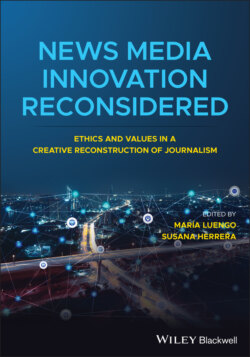Читать книгу News Media Innovation Reconsidered - Группа авторов - Страница 42
Cold-Blooded Neutrality?
ОглавлениеA widespread belief among the legion of critics of objectivity is that objectivity is neither desirable nor possible because it requires humans to turn themselves into perfectly neutral and emotionless analysts—cold-blooded spectators on the urgent issues of life. Why should this be so? As noted, emotions motivate good thinking and inquiry.
Perhaps the classic portrait of the cold-blooded “rational” person is Thomas Gradgrind, the school board superintendent in Charles Dickens’s novel, Hard Times (1854), who treats all questions, including interactions with his children, in terms of numbers, facts, prosperity, and expected utility. Critics of bloodless objectivity then ask rhetorically: Who would support an attitude like that? The response is: No one should; and, luckily, no one has to. Objectivity does not require people to become a “logic machine”—a human Dr. Spock.35
Emotional response to the world is an intrinsic part of ethics. In ethics, appeals to compassion and empathy can and should be part of rational arguments about ethical decisions. Moreover, the best practices of objectivity often combine partiality and impartiality. In a trial, the partiality of the prosecutor and the defense attorney (and the parties they represent) occurs within a larger impartial context— a judge or jury that subjects partial arguments to the test of objective evidence and to the impartial rules of law. Ideally, what is fair and objective emerges during a trial where partialities make their case and are judged by objective norms.
The norms of objectivity were not constructed because its creators thought most humans could be “empty” of bias. The reverse is true. The norms were constructed because of an acute awareness of human bias, because it is evident. Shallow critics of objectivity never tire of saying: “We all have biases.” Rather than conclude that objectivity is impossible because bias is universal, scientists, journalists, and others concluded the opposite: we biased humans need the discipline of objectivity to reduce the ineliminable presence of bias.
Impartiality does not require a strong neutrality or cold-blooded detachment. Impartiality is part of the stance of a person—professor, judge, journalist—who is active and engaged. Impartiality does not mean that one has no partialities. It does not mean that one does not feel the tug of one’s own biases and interests. It does not mean one must withdraw from agency, detached like the neutral gear in my car. It does not require that one can never express a judgment, conclusion, or perspective. What impartiality demands is that a person is willing and capable of not letting their partialities unduly bias their judgment. In my view, the best way to ensure one’s partialities are not biasing one’s thinking is to adopt the stance and standards of pragmatic objectivity. Genuine inquiry derives from an impartial search for the truth, “regardless of what the color of that truth may be.”36
The best journalism is a judicious blend of two fundamental impulses: the emotion-laden romantic impulse and the logic-directed objective impulse. The romantic impulse consists of the passion for interesting stories and substantial revelations. It is the impulse to seek out stories that give the journalist an opportunity for creative writing, interpretation, and self-expression. The objective impulse is the concern to verify what the romantic impulse finds.
